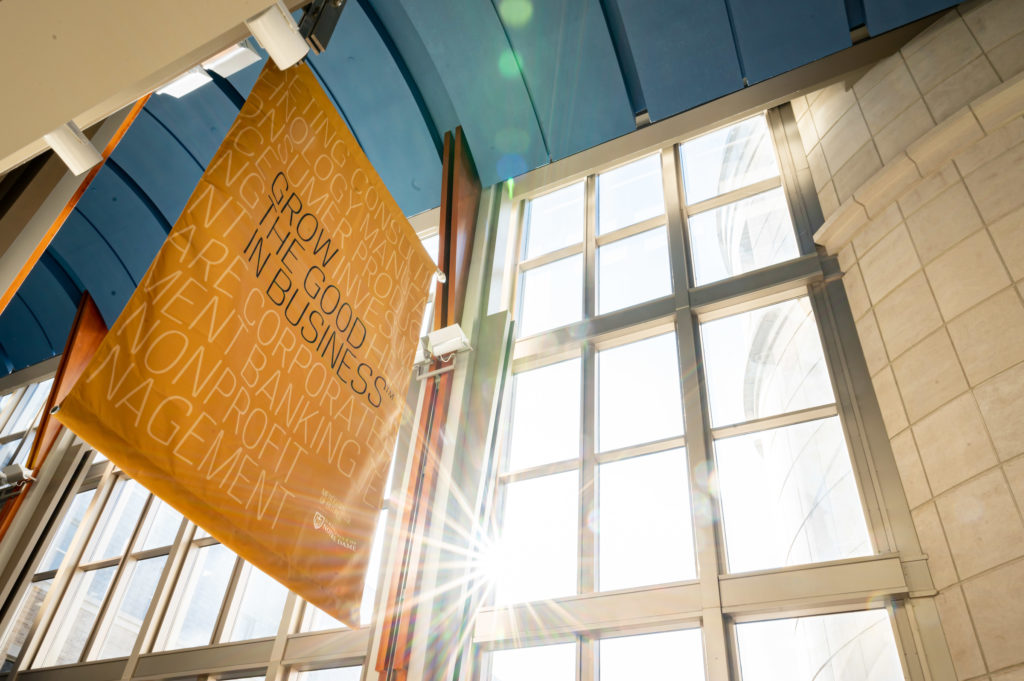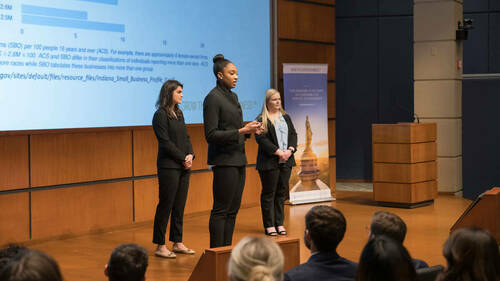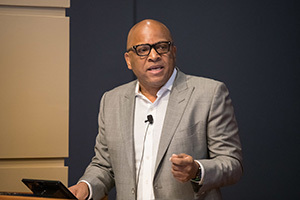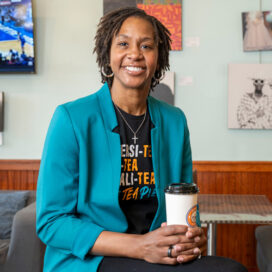Inaugural Diversity, Equity and Inclusion case competition winners address wealth gap
Published: April 6, 2022 / Author: Chloe McCotter

November 3, 2020; “Grow the Good in Business” banner in Mendoza College of Business atrium (Photo by Matt Cashore/University of Notre Dame)
Winners of the inaugural Diversity, Equity and Inclusion Grow the Good in Business Case Competition were announced Friday (April 1) during an event hosted by the University of Notre Dame’s Mendoza College of Business.

Team O’Hara presents their case during the inaugural Diversity, Equity and Inclusion case competition. (Photo by Steve Toepp/University of Notre Dame)
The Diversity, Equity and Inclusion (DE&I) Grow the Good in Business Case Competition launched in February as an innovative way to engage students from Mendoza’s Specialized Master’s Programs in finding creative business solutions that advance DE&I at work and in communities. Using a case provided by the state of Indiana, student teams examined the disproportionate impact of socioeconomic challenges on communities across the state and proposed a business solution to the wealth gap.
Student teams submitted nearly 30 plans. Ten finalists were selected by a panel of Mendoza faculty and staff in the first round of judging in March.
Kristen Collett-Schmitt, associate dean for Specialized Master’s Programs and competition co-organizer, welcomed attendees, saying, “The opportunities and challenges in the DE&I space are complex and multifaceted. The annual DE&I Grow the Good in Business Case Competition will allow us to address many of them year after year and as they evolve into the future.”
Karrah Herring, the chief officer of the Office of Equity, Inclusion and Opportunity for Indiana, outlined the six goals for her team. The goals included ensuring that solutions they implement are sustainable; improving education; building a strong data infrastructure; driving more entrepreneurship from diverse business owners; working with anchor institutions in big business to reimagine strategically focused corporate social responsibility; and codifying the work of their team into legislative statute.
The top three teams presented their cases and answered questions presented to them by the panel of judges.
In first place, Team O’Hara included Master of Science in Management students Katelyn Derifield, Maya Dodson, Maria Schorr and Kelly Straub.
In second place, Team Irish included Suyash Gupta and Sulaiman Noor, Master of Science in Business Analytics students, and Nimoy Vaidya and Nathan Simon, Master of Nonprofit Administration students.
In third place, Team Helios included Master of Nonprofit Administration students Reghan Ward, Patrick Starner and Courtney Kroschel.
The winning team’s case focused on making educational opportunities more accessible to Indiana residents. With greater access to educational opportunities, the members hope to increase the number of Black-owned small businesses. They found that although many educational resources are available in Indiana, there are barriers to accessing them.
Team O’Hara proposed an internship program for high school students, extended bus routes to reach the adult education center and a mentorship program for minority-owned businesses.
The top three teams were awarded prize money in the amounts of $7,000, $4,000 and $2,000, respectively. Teams that finished in fourth through 10th place each received $1,000.
Representatives from the sponsoring organizations as well as Mendoza and other Notre Dame faculty served as judges.

Tracy Graham speaks during the event. (Photo by Steve Toepp/University of Notre Dame)
Tracy Graham, managing principal at Graham Allen Partners and a 1995 alumnus, served as the keynote speaker. Graham shared his path to Notre Dame and beyond.
Graham grew up in the Englewood neighborhood of Chicago, “a neighborhood engulfed by poverty and violence,” he said.
A decision to apply to St. Rita High School, a Catholic school in the heart of Chicago, changed the trajectory of his life. “St. Rita gave me a scholarship and I excelled both academically and athletically. I began to play football, and after some success, earned a scholarship to play for Lou Holtz here in Notre Dame,” he said.
At first, Graham said he felt like an outsider at Notre Dame. “Not just because I’m Black, but because financially, I was different.”
“Thankfully, I was fortunate enough to be surrounded by a community of professors, rectors, coaches and other friends who lifted me up and made me believe that I did belong,” he said. “I am forever grateful to them. Notre Dame transformed the way I thought about myself and my future.”
Through his time at Notre Dame, his eyes were opened to the possibility of success beyond the football field. “The environment at Notre Dame fostered a sense of unlimited possibilities, and slowly my expectations for my life began to change. I started to believe that football was not my only shot at success and that I could be successful without ever making another tackle.”
Graham closed by saying, “We must do all that we can to break down the social barriers that stifle inclusion and opportunity for minorities and women to achieve lasting equity and inclusion in the business community. We must prove that diversity and inclusion is not only the right thing to do, the good thing to do, but that it creates tremendous business value.”
In addition to the state, competition sponsors include the Notre Dame Deloitte Center for Ethical Leadership, KPMG, the South Bend-Elkhart Regional Partnership, 1st Source Bank and Gibson Insurance.
For more information about the Diversity, Equity and Inclusion Grow the Good in Business Case Competition, click here or contact Kristen Collett-Schmitt, associate dean for Specialized Master’s Programs.
Originally posted on ND News.




